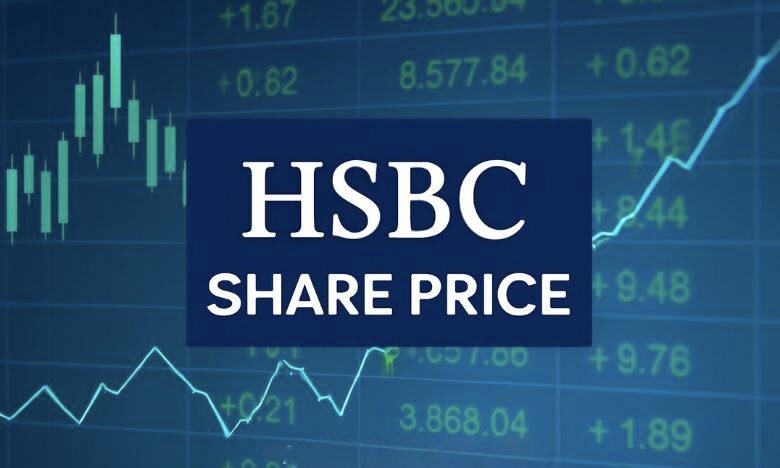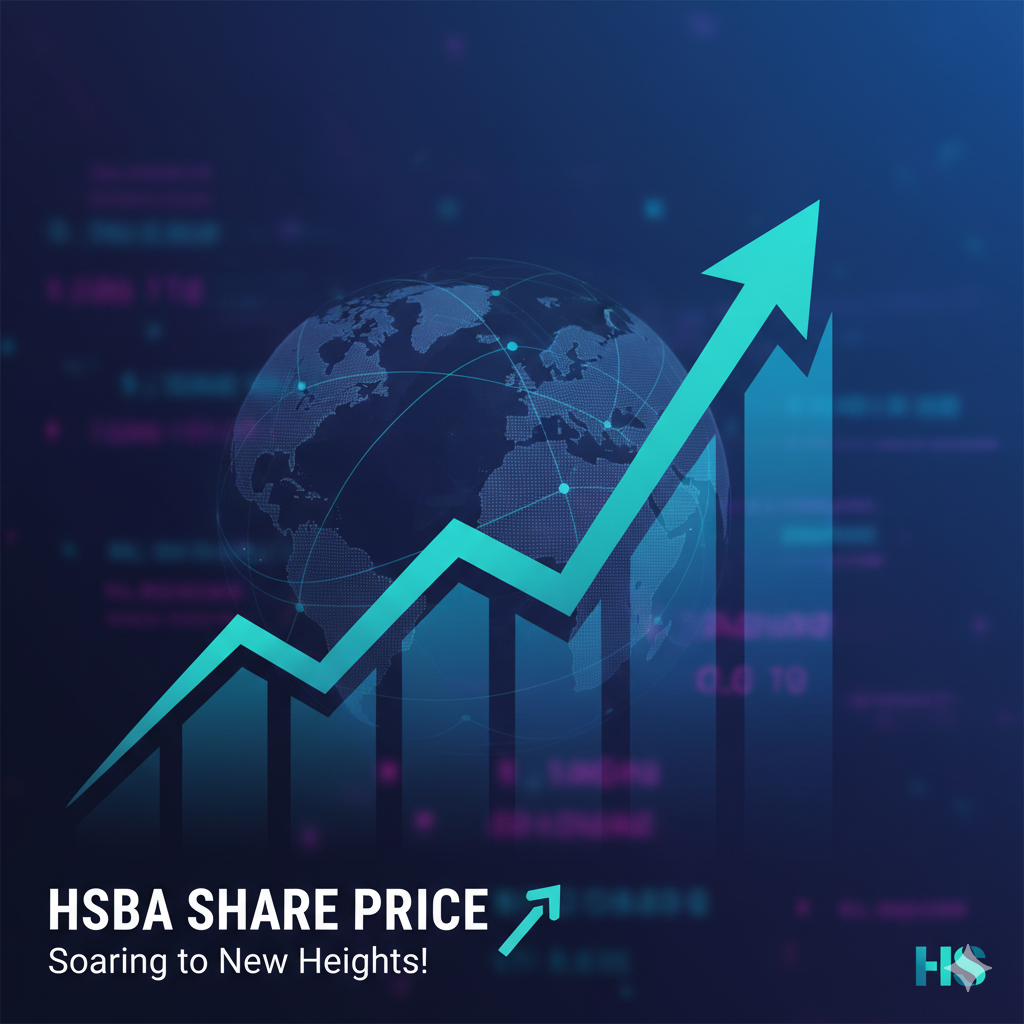Introduction: The Pulse of a Global Giant
As a small business owner, entrepreneur, or startup founder, you’re no stranger to the ripple effects that global financial giants like HSBC can have on the economy. With its extensive presence in banking, asset management, and global markets, HSBC’s share price often becomes a barometer for financial health—not just for the company itself, but for the global economy. So, why does HSBC’s share price matter so much?
In this article, we’ll dive deep into the factors influencing HSBC’s stock in 2025, look at strategies to leverage its movements, and understand how this behemoth continues to adapt in a rapidly changing market.
What is HSBC Share Price?
The HSBC share price is the market value of one share of HSBC Holdings plc, one of the world’s largest banking and financial services organizations. Traded primarily on the London Stock Exchange (LSE), its price fluctuates based on supply and demand dynamics, investor sentiment, and the broader economic environment.
The share price isn’t just an isolated figure. It’s influenced by a multitude of factors, including HSBC’s financial performance, its strategies for growth, and global economic shifts. For small business owners or entrepreneurs, understanding how HSBC’s share price behaves can provide crucial insights into the market trends, potential risks, and opportunities for investment.
Why HSBC Share Price Matters in 2025
The Global Reach of HSBC
With a history spanning over 150 years, HSBC has positioned itself as one of the most prominent international banks. It operates in over 60 countries, serving millions of customers. As a result, any significant change in HSBC’s share price can reflect shifts in global trade, currency fluctuations, geopolitical events, or even broader economic trends.
In 2025, this relevance is amplified. The world is seeing a period of economic recovery post-pandemic, while also contending with new challenges such as inflation, supply chain disruptions, and environmental changes. These macroeconomic factors shape the global financial landscape, influencing the performance of major financial institutions like HSBC.
Investor Sentiment and Market Trends
The share price of HSBC acts as a reflection of investor sentiment. If investors believe that HSBC is positioned well to handle future challenges—whether that’s expanding its digital banking offerings or capitalizing on growth in emerging markets—the share price will likely rise. Conversely, if investors feel uncertain due to internal struggles or external factors, the price may decrease.
For entrepreneurs and investors alike, understanding these shifts can offer a predictive lens for making investment decisions or adjusting business strategies.
Step-by-Step Explanation: How to Analyze HSBC Share Price Movements
1. Track Key Financial Reports
- HSBC publishes quarterly earnings reports, annual financial statements, and other key investor communications. These documents provide insight into the bank’s revenue growth, profit margins, and overall financial health. If HSBC’s reports show strong earnings, the share price may see an upward movement.
2. Follow Global Economic Indicators
- Because HSBC operates internationally, it’s affected by global economic conditions such as interest rates, inflation, and GDP growth in the countries where it has operations. Keep a close eye on economic announcements, particularly in the U.S. and China—two major markets for HSBC.
3. Monitor HSBC’s Strategic Decisions
- Changes in HSBC’s corporate strategy—such as the bank’s shift toward sustainable finance, digital banking, or its exit from certain markets—can affect investor sentiment. Any major mergers, acquisitions, or divestitures will also have a significant impact on its share price.
Tools and Strategies for Monitoring HSBC’s Share Price
Financial News and Analytics Platforms
Platforms like Bloomberg, Reuters, and Yahoo Finance offer real-time updates on HSBC’s stock price, accompanied by expert analysis. These sites also provide historical data, which is useful for long-term trend analysis.
Stock Screeners and Alerts
Using tools like Google Finance or market-specific screeners allows you to set up alerts based on changes in HSBC’s stock price. This can help you stay ahead of major market shifts and news that may affect the stock.
Technical Analysis
For more advanced investors, technical analysis using charting tools like TradingView can provide insight into price movements. By looking at price patterns, volume, and momentum, you can make more informed predictions about HSBC’s future performance.
Common Mistakes and How to Avoid Them
Despite its strong global presence, HSBC’s stock is not immune to volatility. Small business owners and entrepreneurs should be cautious about:
- Overlooking Market Sentiment: HSBC’s share price can be highly sensitive to geopolitical events and economic changes. While it’s tempting to focus on quarterly reports, overlooking the broader market sentiment can lead to missed opportunities.
- Chasing Short-Term Gains: Trying to capitalize on short-term fluctuations can be risky. Given HSBC’s long-term strategy, it’s often better to take a patient, long-term approach to investing.
- Ignoring Risk Management: Investing in stocks, including HSBC, always carries a degree of risk. It’s important to diversify your portfolio and not to place all your investments in one company, no matter how influential it may be.
Case Studies and Data Insights
HSBC’s Recovery from the 2008 Financial Crisis
One of the most telling examples of HSBC’s resilience can be seen in its recovery after the 2008 financial crisis. Despite global instability and a sharp decline in share prices, HSBC managed to rebound due to its diversified business model and strong risk management practices. By 2010, HSBC’s stock had regained its pre-crisis levels, demonstrating its ability to weather major financial storms.
Impact of the Pandemic on HSBC’s Stock Price
In 2020, as the COVID-19 pandemic rocked the global economy, HSBC’s share price saw a sharp decline. However, by 2021, HSBC’s shift towards digital banking and its efforts to scale back operations in underperforming regions led to a rebound. This strategic pivot not only cushioned the blow from the pandemic but set the stage for future growth.
Benefits of Investing in HSBC Shares
- Global Reach: HSBC’s operations span across major economies and emerging markets, giving it a diverse revenue stream.
- Stability: With its deep-rooted history, HSBC has shown resilience during economic downturns.
- Sustainability Focus: HSBC is increasingly positioning itself as a leader in sustainable finance, a growing field that aligns with global investment trends.
Challenges of HSBC Share Price Investment
- Geopolitical Risk: As a global bank, HSBC is vulnerable to the political and economic instability in the countries where it operates.
- Market Volatility: The financial sector is often at the mercy of market shifts, meaning the stock price can fluctuate dramatically in response to external factors.
- Regulatory Pressure: Changes in banking regulations, particularly in Asia and Europe, can impact HSBC’s operations and stock performance.
Future Trends for HSBC Share Price
1. Rise of Digital Banking
HSBC is investing heavily in digital banking services, which may make its share price more attractive to tech-savvy investors. As digital banking becomes increasingly dominant in the global economy, HSBC is poised to capitalize on this shift.
2. Sustainability and Green Finance
In line with global efforts to combat climate change, HSBC’s increased focus on sustainable finance is expected to resonate well with investors looking for ethical investment options. This shift could drive long-term growth in HSBC’s stock price.
FAQs
Q: How often should I check HSBC’s share price?
A: It’s recommended to monitor HSBC’s share price regularly, especially during key financial reporting periods. Quarterly and annual reports are crucial for assessing the company’s performance.
Q: Can I predict HSBC’s share price movements?
A: While it’s impossible to predict with certainty, using tools like financial news, market analysis, and technical charts can help you anticipate price movements based on historical trends.
Q: Is HSBC a good investment in 2025?
A: HSBC’s diverse business model, stability, and focus on sustainability make it an attractive investment option for long-term investors. However, it’s essential to consider market conditions and individual risk tolerance.
Conclusion: Keeping a Close Eye on HSBC Share Price in 2025
In 2025, HSBC’s share price will continue to be shaped by a variety of factors, from global economic shifts to the bank’s strategic pivot toward digital and sustainable finance. Whether you’re a business owner or an investor, understanding how to analyze HSBC’s share price is crucial for making informed decisions.
If you’re looking to diversify your investment portfolio or stay informed about the global financial landscape, keeping track of HSBC’s movements will offer invaluable insights into both risk and opportunity.
Ready to dive deeper into the world of investment? Stay informed, stay ahead.


